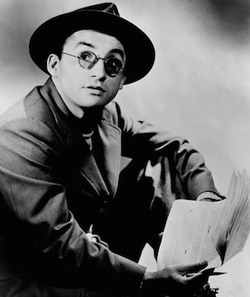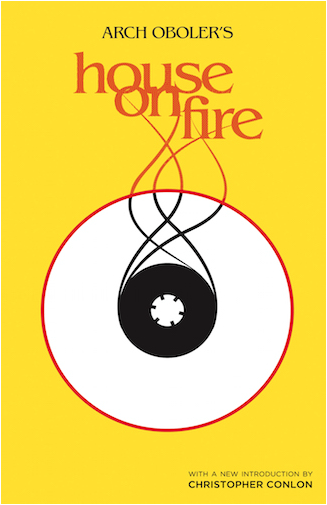|
BOOK DETAILS
Trade paper ISBN-13: 978-1941147559 List Price: $16.99 U.S. Pages: 184 Published: 2015 |
House on Fire (1969)
Arch Oboler With a new introduction by Christopher Conlon Book Description
It starts out innocently enough, when reporters Tony Dumont and Robin Shepherd are sent to interview teenager Mark Elias, a scientific genius, about a scholarship he has won. But it is quickly clear that there is something very strange about the Elias family. Mark and his sister Shirley spend long hours behind closed doors conducting weird and inscrutable experiments involving electricity and a tape recorder. And then there is old Mrs. Elias, the children’s grandmother, who died recently and whom the family seems terrified to discuss. The two journalists believe there may be a more serious news story than the one they were sent to cover, but they have no idea how serious—until people begin to die . . . Arch Oboler (1907-1987) was a major figure in the Golden Age of Radio whose weekly horror program Lights Out terrified listeners in the 1930s and ’40s. In House on Fire (1969), his only novel, Oboler delivers a page-turning chiller that is effective both as an eerie tale of supernatural horror and as an examination of the nature of evil. |
reviews
“An eerie novel . . . an unbeatable combination of suspense, sex and the supernatural . . . highly recommended.” – Baton Rouge Advocate
“The worthy successor to Rosemary’s Baby!” – San Francisco Examiner
“A horror masterpiece!” – Camden Courier Post
“The worthy successor to Rosemary’s Baby!” – San Francisco Examiner
“A horror masterpiece!” – Camden Courier Post
ALSO AVAILABLE THROUGH ONLINE RETAILERS
|
PAPERBACK
Amazon US Amazon UK Barnes and Noble Wordery* *free shipping to 40 countries Fishpond* *free shipping worldwide Waterstones |
AUTHOR BIOGRAPHY

Arch Oboler was born in Chicago in 1907, the son of Jewish immigrants from Latvia. He grew up a voracious reader and early turned to writing, selling his first story when he was ten.
Recognizing radio as a powerful medium for storytelling, Oboler began writing radio scripts in his twenties, selling his first, Futuristics, to NBC in 1933. His big break came in 1936 when Wyllis Cooper departed the popular weekly radio horror program Lights Out and NBC invited Oboler to replace him. His first play, Burial Services, which ended in a young girl being buried alive, proved too much for audiences, and afterwards Oboler toned down the horror, relying largely on the strange and fantastic. But despite the show’s extreme popularity, what Oboler really wanted to write about was Fascism, which he saw as more horrifying than any of the imaginary terrors on Lights Out.
During the 1930s, Oboler wrote and directed radio plays for other programs, often working with the premier stars of the day, such as Bob Hope, Gary Cooper, and Mae West. After Pearl Harbor, Oboler was able to realize his goal of writing anti-Fascist plays and created the new series Plays for Americans, weekly stories laced with wartime propaganda, starring James Stewart, Bette Davis, and others. He also revived Lights Out, working anti-Nazi messages into the weekly episodes.
Like Orson Welles, Oboler made the jump from radio to film; his directing credits include Bewitched (1945), a film noir about a murderer with a split personality that pre-dated Psycho by fifteen years; Five (1951), a post-apocalyptic science fiction film; and Bwana Devil (1952), the movie that sparked the 3D craze of the 1950s.
Oboler also wrote one drama for Broadway, Night of the Auk (1956), directed by Sidney Lumet with an all-star cast that featured Claude Rains, Christopher Plummer, and Dick York. Though it ran for only eight performances, one critic compared it favorably with another of that season’s plays, Eugene O’Neill’s A Long Day’s Journey into Night; it was revived in New York in 2012. In 1969, his only novel, House on Fire, was published and earned comparisons to Ira Levin’s Rosemary’s Baby. Oboler died in California in 1987, aged 79.
Recognizing radio as a powerful medium for storytelling, Oboler began writing radio scripts in his twenties, selling his first, Futuristics, to NBC in 1933. His big break came in 1936 when Wyllis Cooper departed the popular weekly radio horror program Lights Out and NBC invited Oboler to replace him. His first play, Burial Services, which ended in a young girl being buried alive, proved too much for audiences, and afterwards Oboler toned down the horror, relying largely on the strange and fantastic. But despite the show’s extreme popularity, what Oboler really wanted to write about was Fascism, which he saw as more horrifying than any of the imaginary terrors on Lights Out.
During the 1930s, Oboler wrote and directed radio plays for other programs, often working with the premier stars of the day, such as Bob Hope, Gary Cooper, and Mae West. After Pearl Harbor, Oboler was able to realize his goal of writing anti-Fascist plays and created the new series Plays for Americans, weekly stories laced with wartime propaganda, starring James Stewart, Bette Davis, and others. He also revived Lights Out, working anti-Nazi messages into the weekly episodes.
Like Orson Welles, Oboler made the jump from radio to film; his directing credits include Bewitched (1945), a film noir about a murderer with a split personality that pre-dated Psycho by fifteen years; Five (1951), a post-apocalyptic science fiction film; and Bwana Devil (1952), the movie that sparked the 3D craze of the 1950s.
Oboler also wrote one drama for Broadway, Night of the Auk (1956), directed by Sidney Lumet with an all-star cast that featured Claude Rains, Christopher Plummer, and Dick York. Though it ran for only eight performances, one critic compared it favorably with another of that season’s plays, Eugene O’Neill’s A Long Day’s Journey into Night; it was revived in New York in 2012. In 1969, his only novel, House on Fire, was published and earned comparisons to Ira Levin’s Rosemary’s Baby. Oboler died in California in 1987, aged 79.

